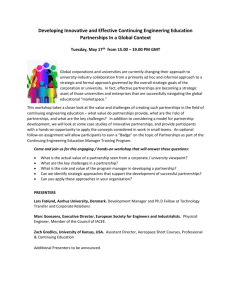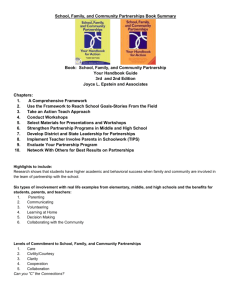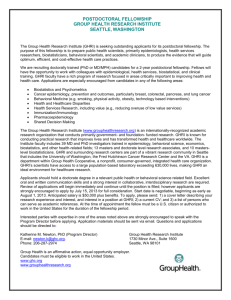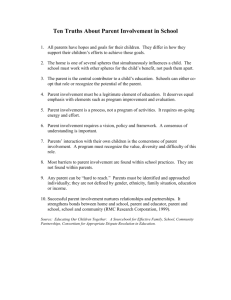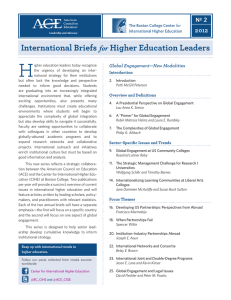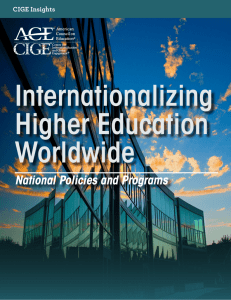Why a Global Health Strategy? - Faculty of Health
advertisement
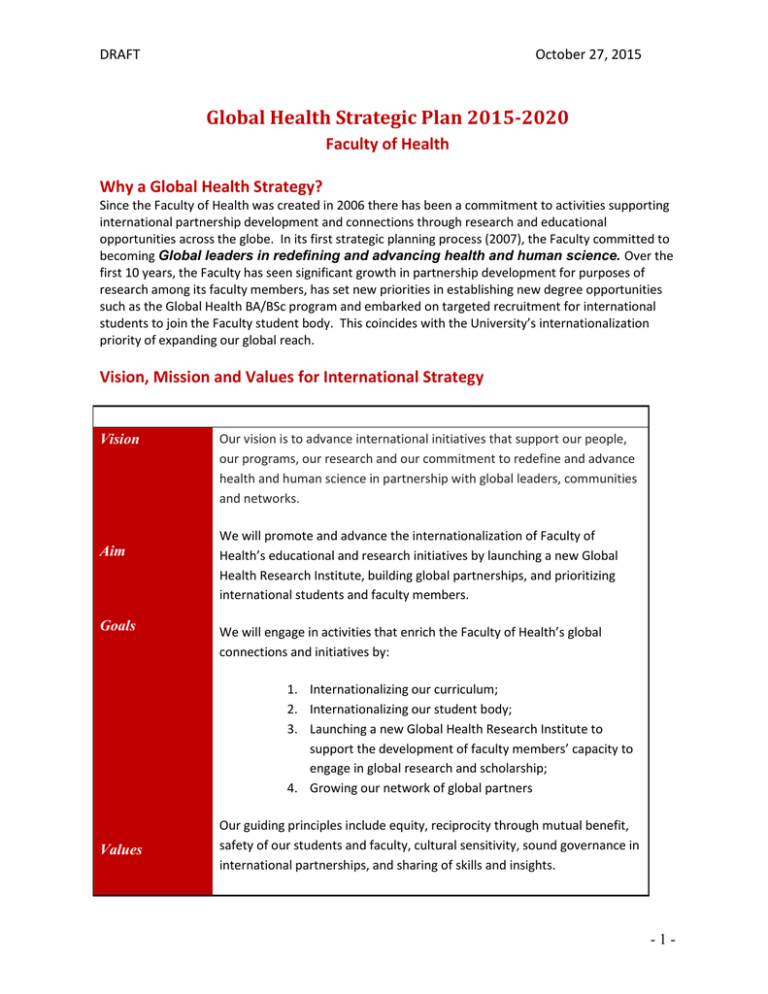
DRAFT October 27, 2015 Global Health Strategic Plan 2015-2020 Faculty of Health Why a Global Health Strategy? Since the Faculty of Health was created in 2006 there has been a commitment to activities supporting international partnership development and connections through research and educational opportunities across the globe. In its first strategic planning process (2007), the Faculty committed to becoming Global leaders in redefining and advancing health and human science. Over the first 10 years, the Faculty has seen significant growth in partnership development for purposes of research among its faculty members, has set new priorities in establishing new degree opportunities such as the Global Health BA/BSc program and embarked on targeted recruitment for international students to join the Faculty student body. This coincides with the University’s internationalization priority of expanding our global reach. Vision, Mission and Values for International Strategy Vision, Mission and Principles for International Health Our vision is to advance international initiatives that support our people, Vision our programs, our research and our commitment to redefine and advance health and human science in partnership with global leaders, communities and networks. Aim Goals We will promote and advance the internationalization of Faculty of Health’s educational and research initiatives by launching a new Global Health Research Institute, building global partnerships, and prioritizing international students and faculty members. We will engage in activities that enrich the Faculty of Health’s global connections and initiatives by: 1. Internationalizing our curriculum; 2. Internationalizing our student body; 3. Launching a new Global Health Research Institute to support the development of faculty members’ capacity to engage in global research and scholarship; 4. Growing our network of global partners Values Our guiding principles include equity, reciprocity through mutual benefit, safety of our students and faculty, cultural sensitivity, sound governance in international partnerships, and sharing of skills and insights. -1- DRAFT October 27, 2015 Each goal is outlined below as to 12 month (2015-2016) and five year 2020 outcomes. Goal 1: Internationalizing our curriculum Expected Outcomes 12 months Expected Outcomes 5 years BA/BSc in Global Health first two years are implemented and years 3 and 4 are being developed. New professional Global Health Masters (MA and MSc) plan is underway. New course proposals developed with opportunities for international study. Review of programs to address international perspectives. Negotiate mobility grants with York International to support student placements. Student exchanges abroad increase in all our units. Increase program field placement opportunities. Increase course offerings to an international audience through online methods. Explore international opportunities for continuing education and professional development through HLLN . Inaugural class in Global Health graduates. Evaluation of the GH program is initiated. Professional Masters in Global Health (MA and MSc) implemented. Global Health incorporated in the faculty’s research Masters and Doctoral programs (eg. Diploma in Global Health). Five new courses offer study abroad or links with international universities. The number of students who experience exchanges doubles. Mobility grants with matching funds from York International and Faculty of Health are implemented. Field placements abroad increase. International students who take our on-line courses increases. HLLN offers 4 programs in the global market. Goal 2: Internationalizing our student body Expected Outcomes 12 months Recruitment of international students commences with focus on India with the support of the York University English Language Institute (YUELI). Expected Outcomes 5 years Programs in Health increase international student enrollment by 15%. YUELI Bridging Program implemented -2- DRAFT October 27, 2015 An academic support system exists for international students – including advising needs; English language support – in collaboration with York International. Scholarships for International students in Health have been investigated. Increased communication of opportunities to all Health students. Pre departure and post return protocols for students studying abroad are developed and standardized. Alumni international outreach occurs. for programs in Faculty of Health. Support structures for international students and for students studying abroad are mounted and implemented. Structures are in place for crossdisciplinary programs pan-university and in collaboration with key universities globally. Development of joint graduate degrees or formal co-tutelle structures with international universities. Alumni mailings include opportunities for mentorship internationally. Goal 3: Launching a new Global Health Research Institute to support the Development of faculty members’ capacity to engage in global research and education Expected Outcomes 12 months A global health seminar series and communication strategy is launched to support faculty members’ interest in global research. Faculty, postdoctoral and graduate student mobility supported through new funding mechanisms such as postdoctoral fellowships and York International Mobility Grants. A Global Health Research Institute is launched as an institutional research priority. Faculty complement needs identified and 5-year hiring plan developed to support the Global Health Program and global health research. Community Leaders in Residence program is planned within the GHRI. Strong connections between the Faculty and York International are established with a clear definition of roles and processes. Expected Outcomes 5 years Faculty members are engaged in research and curriculum developed to support global health initiatives. Proposal for Visiting Scholars to the Faculty is established and implemented. York University supports the Global Health Research Institute as a research priority. Faculty complement hired to engage in global health research including a Canada Research Chair in Global Governance, and Director of the GHRI. Community Leaders in Residence program is implemented in the GHRI. Faculty of Health works collaboratively with York International. -3- DRAFT October 27, 2015 Faculty of Health promotes a positive approach to internationalization for the university. Increased Faculty capacity to support international scholarship including faculty involvement in collaborative international research during sabbaticals. An inventory of international funding sources for which Canadians’ are eligible as Principal investigators is developed through the GHRI in collaboration with Vice President Research and Innovation and circulated to faculty members. Faculty members’ international research is funded by tri-council awards such as CIHR Grand Challenges, the Canadian International Development Research Centre (IDRC) and international opportunities. A global health website is developed and linked to the Canadian Coalition for Global Health Research (CCGHR) and York International websites Goal 4: Growing our network of global partners Expected Outcomes 12 months An environmental scan of all current partnerships for educational and research purposes is complete. A database of MOU’s involving FoH is established for both placement opportunities and research. Expected Outcomes 5 years Visiting scholar/student policies are implemented. Faculty support for international scholarship by faculty members is established, including incentives for international sabbatical research. Faculty exchanges increase through internal award funding. Determine priority international regions, universities and Non Governmental Organizations (NGOs) with whom we will develop strategic partnerships in each continent. These may include: Sri Lanka, Finland, Sweden, Kenya, Ghana and others. Develop international public, nonprofit and private sector research partnerships to support the attainment of the United Nation’s Sustainable Development Goals. Leverage current partnerships with organizations in India, China, Norway (Bergen), France (Avignon), Kenya (Moi), Rwanda, and Brazil. Establish agreements with priority university and NGO partners through formal agreement for research and education, including Avignon and Laval Universities and Southern Voice. -4- DRAFT October 27, 2015 Create a “Social Innovation Think Thank” as a virtual hub for established international scholars to mentor new and emerging leaders. Educational program partnerships include 2 + 2 models of domestic and international partnerships. Establish an agreement with the “tropEd Network for Education in International Health” (Heidelberg University) and other global networks. Advance knowledge translation by creating a leadership development program through the GHRI that supports KT of new and emerging scholars’ research and innovation in local and international contexts. -5-
